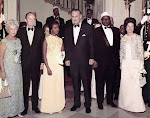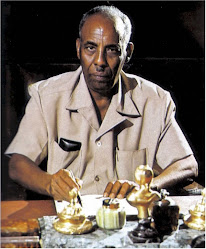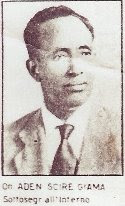update Somali-American Aden al-Ansari and Cabdi Salaam al-Muhajir, carried out Somalia suicide bombing, Islamists claim
Abdisalan Ali is one of 20 missing Somali youth from MN
MOGADISHU, Somalia — The voice in the recording sounds unmistakably familiar — the tenor, the colloquialisms — a boy who grew up in America. The recording was a suicide message, posted online on Sunday by an Islamist militia aligned with Al Qaeda. The voice was said to be that of Abdisalan Hussein Ali, 22, who was born in Somalia but spent his formative years in Minneapolis. His life appeared to have come full circle here on Saturday, when he is said to have blown himself up in an attack on African Union troops in Mogadishu. He would be the third American known to become a suicide bomber for Somalia’s Shabab rebels. The Shabab said that Mr. Ali was one of two suicide bombers in the attack, which the militant group said killed scores of peacekeepers. The African Union has confirmed that it suffered casualties, but has not disclosed the number. But as the Shabab have lost power and support in Somalia in recent months, the battle has turned into a war of words as much as weapons, and the claim of an American suicide bomber packs a powerful punch. Omar Jamal, a Somali diplomat at the United Nations, said that Mr. Ali was one of the bombers. Mr. Ali’s friends and family listened to the recording, Mr. Jamal said, “and they all say that it is him.” A spokesman for the American Embassy in Nairobi said the United States had “seen reports” that one of the bombers was an American citizen, and was investigating them. Mr. Ali was known by the F.B.I. to be one of an estimated 30 Americans who have joined the Shabab, at least 20 of whom came from the Somali community in Minneapolis. He had been an ambitious pre-med student at the University of Minnesota, hoping for an internship at the Mayo Clinic, before he disappeared in 2008. The audio recording, in which the speaker exhorts Westerners to join the fight, appears to reflect those qualities. “Don’t just sit around, you know, and be, you know, a couch potato and just like, just chill all day,” the voice on the recording says. “Today jihad is what is most important. It’s not important that you become a doctor, or some sort of engineer.” For Mr. Ali, life began in war and seems to have ended that way. He was only a few months old when his family fled the strife in Somalia in a makeshift boat, landing first at a Kenyan refugee camp, his mother told The New York Times in a 2009 interview. The family, with 12 children, arrived in Seattle in 2000 and then moved to Minneapolis. Minneapolis has embraced generations of refugees from around the world, and Mr. Ali’s high school, Thomas Alva Edison High in northeast Minneapolis, calls itself an “International World School,” offering open houses to prospective students in Spanish; Hmong, which is spoken in Southeast Asia; and Somali. During high school, he sold sneakers out of his locker to make money to help support his family. He lifted weights, and his friends called him “Bullethead.” He was elected president of the school’s Somali Student Association, and he later became a caseworker at a prestigious law firm. At the University of Minnesota, he majored in chemistry and held a part-time job as a security guard at the management school there. “He was a highly motivated kid,” said a fellow student, an upperclassman who became his mentor. “He wanted to change lives.” Why and when he turned to Islamic militancy is unclear. A friend of Mr. Ali’s, who attended middle school and then college with him, said they were part of a tight-knit group of Somali-Americans who grew up together and would talk about Somalia and debate politics. “There was a desire in all of us, that our parents always talk about, the great Somalia,” the friend said, who did not want to be identified for fear of being questioned by the F.B.I. Mr. Ali was not her first Somali friend to join the Shabab, she said, nor the first to die as a member of the group. She described Mr. Ali as “very outgoing.” “We used to call him a womanizer,” she said. “He was always in with the ladies. But then all that changed.” In Arabic class, he started sitting in the back, not talking to anyone. “But then again, you’re not going to look at him and say his personality changed, he’s going to get radical and leave the country,” she said. “In college that’s when you find out who you are, so I didn’t think much of it then.” One night in 2008, he was wrongly accused of robbing a Subway sandwich shop on campus. Friends said the experience left a mark on him long after the charges were dropped. In November 2008, he disappeared, along with two other Somali-Americans. “For an unknown reason the family thinks that” Mr. Ali “may have got on a plane and went somewhere,” a Minneapolis Police Department missing persons report says. The Shabab, which controlled most of southern Somalia by the end of last year but have since lost ground, have posted videos on YouTube aimed at encouraging young Somali-Americans to come here. Many have heeded the call. In October 2008, Shirwa Ahmed, also from Minneapolis, blew himself up in one of a string of Shabab attacks in northern Somalia. In May of this year, Farah Mohamed Beledi, 27, of St. Paul, tried to attack a government checkpoint in Mogadishu but was killed by African Union troops before he could detonate his explosives. Another American, from Washington State, was reported to have been part of a suicide squad that attacked an African Union base in Mogadishu in 2009, killing more than 15 peacekeepers, but his identity has not been confirmed. And this month, two Somali-American women from Minnesota were convicted of aiding the Shabab. However, many Somali-Americans have returned, not to fight, but to help rebuild the country, including the current prime minister and his predecessor. Speaking of Saturday’s suicide attack, the weak American-backed transitional government expressed sorrow over what it said was not just a loss of life, but of a vital human resource. “It’s tragic, because we were hoping for this young man to come back and take part in the rebuilding of the country,” said Suldan A. Farahsed, a government spokesman. “We needed young people like that.” Mr. Ali kept in touch with his old life back in the United States by telephone and Facebook. His Facebook page shows him wearing a skullcap and wielding a baseball bat. The friend says that Mr. Ali and a mutual friend last exchanged Facebook messages three weeks ago, but that the mutual friend stopped contacting Mr. Ali because “he said things that made her uncomfortable.” Two years ago, he told a friend in Minneapolis that he would never attack the United States. “Why would I do that?” the friend recalled Mr. Ali saying. “My mom could be walking down the street.” nyt





.jpg)











No comments:
Post a Comment